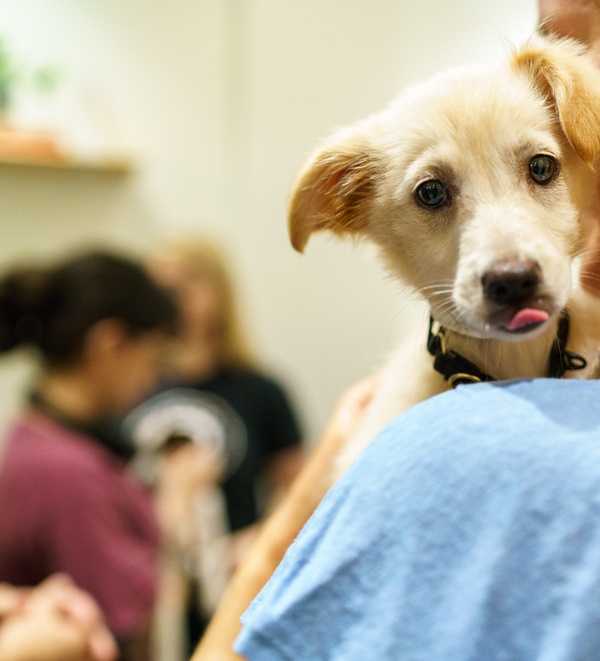
Puppy Development: When Does a Puppy Become a Dog?
Many of us wish puppies could stay puppies forever. Afterall, who can resist a puppy’s big eyes, clumsy steps, and joyful curiosity?
But, as we know, all puppies grow up. Here's what to expect during your new puppy's development and tips on how to best nurture healthy growth and development.
When Do Puppies Stop Growing?
Every pup is unique, but in general, larger breed dogs take longer to reach adulthood than smaller breeds do.
The average ages of maturity for dogs are as follows:
- Small and toy dog breeds: 8-12 months
- Medium dog breeds: 12 months
- Large and giant dog breeds: 12-24 months
At early adulthood, your puppy may still have lots of playful energy — but they should be finished growing.
Are There Full-Grown Adult Dogs that Look Like Puppies?
All puppies grow up. But, if you like a certain feature about your puppy — such as their small size, big brown eyes, or fun-loving nature — you may be able to find a breed with similar qualities as adults.
If it’s a small, “puppy-sized” dog you’re looking for, there are plenty of toy and small breeds — such as Pomeranians and Maltese — out there.
If, on the other hand, you enjoy a puppy’s adventurous and playful demeanor, you might prefer a happy-go-lucky, playful adult, such as a Labrador Retriever.
Birth to 4 Weeks Old: A Whole New World
Puppies are born blind and deaf, and they experience the world primarily through scent and touch. In the first 2 weeks of life, they spend most of their time nursing and sleeping.
At 2-4 weeks, puppies become more active. Their eyes and ears open, and they begin to take their first steps.
4 to 12 Weeks Old: Big Transitions
Soft puppy food can be introduced at 3-4 weeks, and most pups wean off their mother’s milk by 6-8 weeks of age.
Puppies should be receiving vaccines from a veterinarian for protection and immune system development starting at 6-8 weeks. Booster shots are given every 3-4 weeks until a puppy is 16 weeks old.
Once they’re 8-12 weeks of age, puppies are old enough to be adopted.
The 4- to 12-week window also represents an important period for socialization.
Socialization
Socialization is the process of introducing your puppy to new people, animals, environments, and experiences. And, it can be a lot of fun!
The process of socialization helps your puppy learn, and it makes them more likely to adapt well to new situations as an adult (and less likely to develop phobias or anxiety).
A few fun ways to socialize your puppy include:
- Introduce your pup to new people of all ages and genders (start with one new person at a time — too much at once can be overwhelming), and donning different styles of clothing and accessories like hats, umbrellas, a cane, etc.
- Ring the doorbell and knock on your door.
- Walk your puppy on different surfaces, such as tile, wood, carpet, grass, and cement.
- Offer your furry friend new toys and puzzle feeders.
- Join a puppy socialization class (look for one where all pups are up to date on vaccines and parasite prevention).
The 4- to 12-week age window is the most beneficial time for socialization. And, weeks 8-12 are a great time to start potty training or other types of basic dog training.
But, if your puppy’s already older than 12 weeks, don’t worry! They can still benefit mentally and emotionally from these activities.
Teething
Just like humans, puppies sprout deciduous (baby) teeth when they’re young, which are replaced by adult chompers in adolescence.
Most pups get all their baby teeth by 8 weeks of age.
Then, their adult teeth come in between 3-6 months of age. Puppy-proofing your home (putting away shoes, electric cords, or other objects your puppy could chew) and providing safe chewing toys are important during this time.
When to Spay or Neuter
Spaying or neutering your puppy is an important decision in their early life. A “spay” describes the procedure for females, while a “neuter” is the term for males.
This surgery prevents unwanted litters of puppies, reduces undesirable behaviors, and diminishes health risks that come from hormonal influences.
Six months is a common age for the procedure, and ideal for most dogs. But, the latest research suggests it may be better for large or giant breed dogs to wait until they’re full grown.
Check with our vets to learn what’s best for your unique puppy.
LEARN MORE ABOUT SPAYING OR NEUTERING AT BOND VET
Nurturing Your Puppy Mentally & Physically
As mentioned, socialization is important for your puppy’s mental and emotional development.
When it comes to physical growth and health, try these tips:
- Feed them a nutritionally-complete and balanced puppy food. Food designed for puppies, unlike adult dog food, contains nutrients necessary to meet your pup’s metabolic needs. It also avoids excesses of other components that may found in dog food not formulated for puppies, such as calcium, which could lead to developmental bone problems. A special note for large breed puppies: You’ll want to offer large breed puppy food, which is designed for steady growth, to prevent health problems that could occur with accelerated growth. You can read more about feeding your puppy here.
- Encourage playtime. Obesity is one of the most common health problems affecting pets today. So, by encouraging good playtime habits from the start, your dog will be more likely to keep up a healthy level of exercise as an adult. Read more about exercising your pet here.
Puppyhood is a fun and special life stage.
By taking care of your puppy's mental, physical, and emotional development, you’ll be setting your pal up for a healthy adulthood and your friendship will continue to grow!